Speakers - National Security and Innovation Conference 2023
Morning Keynote Speaker

Ron Corsetti enjoys working at the intersection of people, technology, and applications to find solutions and propel organizations forward. He builds and leads high performance teams at this confluence of ideas, sound practice, and energy.
Ron is managing director of White Birch Analytics, a due diligence and advisory services firm. Previous roles include P&L responsibility for a $250MM company and span over 30 years in operations, program management, corporate and business development, and government affairs. He served as President of Equitus National Security Group, a graph data fabric technology firm supporting special operations and intelligence customers; directed the applied research & technology strategy of Collins Aerospace, a $19B, 71,000 employee company within Raytheon Technology Corporation; was VP, Tactical Systems at Kongsberg Gruppen ASA; President & CEO of TGI, where he arranged its acquisition by Kongsberg; VP, Strategy & Corporate Development responsible for the defense holdings portfolio of J. H. Whitney & Company; head of strategy and business development at Impact Science and Technology, an electronic warfare firm that grew from $10MM to $400MM in ARR in five years (now L3Harris); and held senior program management positions in advanced technology there and in Sensors & Communications Corporation (now L3Harris). Ron established and led the New England operations of NAVTEQ (now Nokia) from start-up through multiple rounds of funding and an IPO during its advent of digital map, inertial, and GPS guided systems that revolutionized personal navigation and launched an entire industry.
Ron retired from the U.S. Army as a Colonel in 2022 after 34 years of service in the Regular Army and Army Reserve. His last assignment was as the Eastern U.S. and European Group Director of the 75th Innovation Command in support of Army Futures Command. In this role he influenced the design of the largest restructuring of the U.S. Army since the Vietnam War. Other assignments include command, operational, staff, and support positions with U.S. Special Operations Command, U.S. Strategic Command, Army Legislative Affairs, U.S. Army Development Command, U.S. European Command, the Defense Intelligence Agency, Special Operations Command Pacific, XVIII Airborne Corps, 10th Mountain Division, and 2nd Infantry Division. He holds qualifications in the Acquisition Corps, Military Intelligence, and Signal Corps. His awards include the Legion of Merit.
Ron earned degrees from MIT, Tufts University, National Intelligence University, and Boston University; all under full scholarship. Ron was commissioned in the Regular Army as a Distinguished Military Graduate of Army R.O.T.C. and attended Airborne and Ranger Schools while a cadet. His military education includes the U.S. Army War College and Naval Postgraduate School.
Ron’s board service includes philanthropic, businesses, and institutional organizations. He is a mentor in the MIT Gordon Engineering Leadership program and is passionate about talent development and technology advancement to improve our world.
Breakout Session 1
Government as an Incubator

Nick Reese is the cofounder and Managing Partner of the Frontier Foundry Corporation. Prior to building his company, he most recently served as the first ever Director of Emerging Technology Policy at the US Department of Homeland Security where he advised the White House and senior Cabinet officials on national security implications of emerging technologies. He is the author of the DHS AI Strategy and the lead DHS representative for the development of Space Policy Directive-5, National Security Memorandum-10, the National Space Policy, and Executive Order 13960. A noted expert in artificial intelligence policy and implementation, Mr. Reese focuses on public-private partnerships and the creation of effective policy to stimulate technical innovation with public trust. A noted expert in cybersecurity, quantum computing, artificial intelligence, and outer space, he currently holds faculty positions at New York University and George Washington University where he designed and delivered unique course offerings related to emerging technology and geopolitics. He has been a member of the AI Network of Experts for the Organization for Economic Cooperation and Development (OECD) since 2020 where he served on the Expert Group on AI Risk and Accountability. Mr. Reese has a 20+ year career in the US Military, Intelligence Community & Homeland security with a focus on operations and bringing technical solutions to high stakes national security challenges. From the front lines of the War on Terror to building Quantum Computing Policy he has been an instrumental actor in protecting our nation with eye both on today and the future.
Mr. Reese is a graduate of Saint Leo University and Old Dominion University. He lives in the Washington DC area with his wife and their dog.
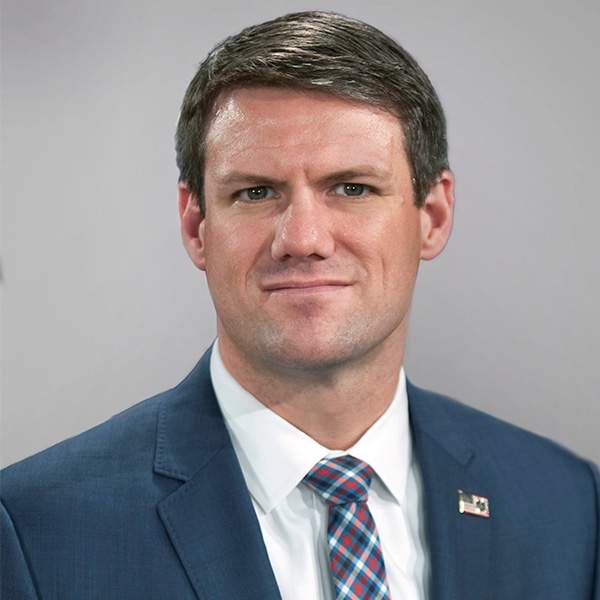
Matt Hayden serves as GDIT’s vice president of cyber and emerging threats. As a senior cyber executive within GDIT’s Intelligence and Homeland Security division, he is responsible for fostering trusted relationships with industry partners and key cyber executive government leadership, delivering cyber growth strategies, and advancing the company’s cyber thought leadership.
Hayden has more than 20 years of experience in cyber technology and cyber policy. Previously, Hayden served as the Assistant Secretary for Cyber, Infrastructure, Risk and Resilience Policy at the U.S. Department of Homeland Security. He led the policy development for department-wide efforts to reduce national risks with a focus on critical infrastructure cybersecurity, federal network security and cyber-crime. Hayden’s efforts played a critical role in improving the security and strength of the global cyber ecosystem. Additionally, he served as an expert advisor on cyber, infrastructure, risk and resilience issues to the undersecretary, secretary, and other high-level officials.
Hayden previously served as Senior Advisor to the Director of the Cybersecurity and Infrastructure Security Agency, and Deputy Assistant Secretary for the Private Sector within the Office of Partnership and Engagement at the DHS. In these roles, Hayden served as a senior leader of the department and as a voice for industry within government, advising on the impact of the policies, regulations, and processes on private sector companies. He also enhanced partnerships and strategic communications to help the public and private sectors jointly meet their shared responsibilities for protecting and strengthening the nation’s critical infrastructure against cyber and physical threats.
Prior to joining DHS, Mr. Hayden was a senior executive with the National Disability Rights Network focusing on the use of technology and modernization for the national membership including, accessibility of digital content, securing PII, cloud utilization, and e-records management.
Why the public sector is emerging as an attractive end market
 Nate Ashton
Nate Ashton
Nate Ashton is an Entrepreneur-in-Residence focused on climate tech at the University of Colorado, Boulder and an advisor at DC-based advisory firm Dcode, where he previously led public policy efforts and tech accelerator programs. Nate also serves as a member of the board of directors of The Alliance for Commercial Technology in Government, where he served as the founding Executive Director. Earlier in his career, Nate held a number of roles at the White House, on Capitol Hill, and on political campaigns.
 Tyler Sweatt is the CEO of Second Front Systems (2F). He works with government and commercial customers to reduce barriers between commercial technology and defense and national security communities. His focus is on changing how global government agencies identify, engage, and vet commercial technology companies and how commercial technology companies deliver software to government users.
Tyler Sweatt is the CEO of Second Front Systems (2F). He works with government and commercial customers to reduce barriers between commercial technology and defense and national security communities. His focus is on changing how global government agencies identify, engage, and vet commercial technology companies and how commercial technology companies deliver software to government users.
He is also a Technical Advisor at Pallas Advisors, and a partner at the non-profit Silicon Valley Defense Group.
Previously, Tyler served as the Head of National Security at CalypsoAI and founded and sold technology advisory firm Future Tense. He also led the emerging technology and security practice at Toffler Associates, working with US and international governments and corporations to build strategies for rapidly changing technology and security landscapes. A graduate of the United States Military Academy at West Point, Tyler is a former U.S. Army officer.
 David Kovar is the CEO and founder of URSA Inc. URSA provides UAV / CUAS data analysis services via a platform and on a consulting basis. David took URSA through three accelerator programs – Techstars sponsored by AFWERX, the Canadian Creative Destruction Labs, DCode’s short form program, and Pangiam/DCode’s Trade and Travel CUAS focused program.
David Kovar is the CEO and founder of URSA Inc. URSA provides UAV / CUAS data analysis services via a platform and on a consulting basis. David took URSA through three accelerator programs – Techstars sponsored by AFWERX, the Canadian Creative Destruction Labs, DCode’s short form program, and Pangiam/DCode’s Trade and Travel CUAS focused program.
Mr. Kovar has written multiple SBIRs and won five, including a $1.875M SBIR Phase II and a second $1.8M DARPA SBIR Phase II. URSA has partnered with Raytheon on SBIRs, contracted to Draper on UAS cyber security vulnerabilities, served as the system of record for a Bureau of Prisons CUAS test and evaluation exercise, and is currently the data analytics platform for an ASSURE / FAA contract investigating low altitude risks associated with UAVs.
Mr. Kovar is the only private sector member of the New Hampshire IAC (fusion center) where he participates on the UAS, counter UAS and cyber security groups. He is also an unpaid intern with the Delaware Emergency Management Agency where he provides UAS / CUAS analysis and policy development services. He completed the California POST course for reserve officers and has been involved with search and rescue for 25 years.
Mr. Kovar founded the practice of UAV forensics in 2015 and is one of the leading practitioners in the world. He has worked in digital forensics and cyber security since the mid 90’s and, prior to founding his own company, led EY’s U.S. incident response program. Mr. Kovar earned a BA from Dartmouth in Computer Science and received a Masters degree from the Fletcher School at Tufts in International Affairs in 2020. His Master’s thesis is entitled “Defending Against UAVs Operated by Non-State Actors
Through the worm hole
 Jeremy Hitchcock is a co-founder and Partner at New North Ventures, an early stage venture fund advancing innovation in the national interest. Jeremy is also the host of Securing our Future, a podcast that explores how commercial and national security sectors work together to accelerate innovation. Prior to New North Ventures, Jeremy was co-founder and CEO of Dyn, an Internet data company acquired by Oracle in 2017 for over $600 million. He also co-founded Minim (NASDAQ:MINM), a consumer networking company manufacturing intelligent edge networking devices. Located in Manchester, NH, Jeremy holds a B.S. in Management Information Systems from Worcester Polytechnic Institute (WPI) and New Hampshire Tech Alliance. Previously he was a trustee at Worcester Polytechnic Institution, Southern New Hampshire University and the Community College System of New Hampshire. Alongside his wife, Liz, he owns an independent bookstore, Bookery Manchester
Jeremy Hitchcock is a co-founder and Partner at New North Ventures, an early stage venture fund advancing innovation in the national interest. Jeremy is also the host of Securing our Future, a podcast that explores how commercial and national security sectors work together to accelerate innovation. Prior to New North Ventures, Jeremy was co-founder and CEO of Dyn, an Internet data company acquired by Oracle in 2017 for over $600 million. He also co-founded Minim (NASDAQ:MINM), a consumer networking company manufacturing intelligent edge networking devices. Located in Manchester, NH, Jeremy holds a B.S. in Management Information Systems from Worcester Polytechnic Institute (WPI) and New Hampshire Tech Alliance. Previously he was a trustee at Worcester Polytechnic Institution, Southern New Hampshire University and the Community College System of New Hampshire. Alongside his wife, Liz, he owns an independent bookstore, Bookery Manchester
 Trevor Hough is a former national security policy executive with deep operational expertise on defense and intelligence tech evaluation and implementation. Trevor retired from the U.S. Army in 2022 as after serving almost 30 years in the Army from the rank of Private to Colonel and assignments ranging from enlisted Infantryman to the White House. He spent most of his military career leading efforts to better understand data and make data and tech work for operational decision making and effect.
Trevor Hough is a former national security policy executive with deep operational expertise on defense and intelligence tech evaluation and implementation. Trevor retired from the U.S. Army in 2022 as after serving almost 30 years in the Army from the rank of Private to Colonel and assignments ranging from enlisted Infantryman to the White House. He spent most of his military career leading efforts to better understand data and make data and tech work for operational decision making and effect.
Trevor’s assignments include helping to lead the National Geospatial-Intelligence Agency’s (NGA) missions in Counterterrorism and in the Middle East; commanding the Joint Special Operations Command Intelligence Brigade; two years at the White House serving as Middle East Policy Advisor to Vice President Michael Pence and then on the National Security Council Staff where he managed all of the Department of Defense’s (DoD) sensitive activities; Counterterrorism and Special Operations Intelligence Branch Chief on the Joint Chiefs of Staff J2, and serving in Armored Cavalry and Special Operations units at levels ranging from Special Forces Company to commanding a Special Operations Intelligence Brigade. Trevor is a veteran of several overseas deployments and assignments.
He earned a BA from Norwich University and a MS degree from the Naval Postgraduate School. He is the founder and owner of the ADK Group, an advisory firm focused on helping companies scale up while bridging the gap between private capital, companies building innovative dual use technology, and national security organizations from both the U.S. and our allies.
 Keeley McAfee is a Senior Associate at Decisive Point, providing direct support to early-stage ventures across the firm's strategic advisory, acceleration, and venture investment portfolios. Prior to joining Decisive Point, Keeley worked at Kraft Heinz where she was a financial analyst, serving in Revenue Management and Financial Planning & Analysis (FP&A) roles across multiple business units. She leverages her well-developed analytical skillset and deep financial acumen to deliver actionable insights to portfolio companies as they scale in the federal market. Keeley graduated from Harvard University in 2019 with a degree in Government.
Keeley McAfee is a Senior Associate at Decisive Point, providing direct support to early-stage ventures across the firm's strategic advisory, acceleration, and venture investment portfolios. Prior to joining Decisive Point, Keeley worked at Kraft Heinz where she was a financial analyst, serving in Revenue Management and Financial Planning & Analysis (FP&A) roles across multiple business units. She leverages her well-developed analytical skillset and deep financial acumen to deliver actionable insights to portfolio companies as they scale in the federal market. Keeley graduated from Harvard University in 2019 with a degree in Government.
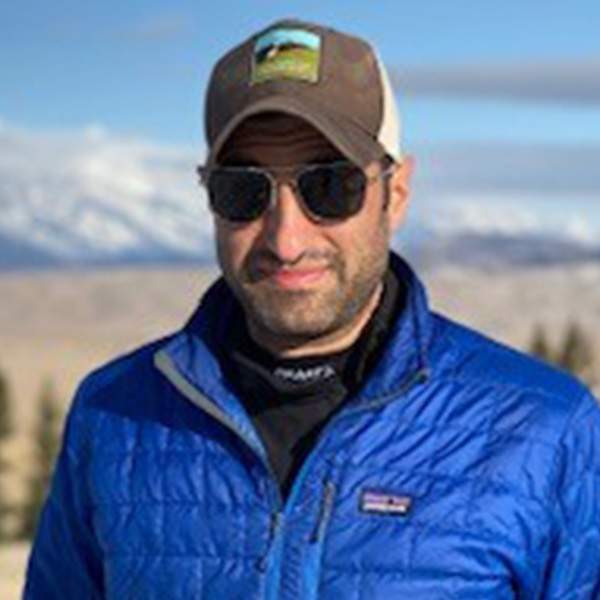 LTC Adam Caruso is a US Army Special Forces officer currently assigned as US Special Operations Command’s (USSOCOM) Technology Liaison for Boston and the New England region. In his role as the “Tech LNO” to Boston, Adam is USSOCOM’s representative to research, academia, government and industry partners working in the collaborative science and technology and innovation ecosystems. Adam was the first officer selected to serve in this role in 2021, and began the mission of building a technology liaison office to provide a direct connection between technology developers and innovators with the Special Operations Forces enterprise. Adam graduated from Northeastern University and was commissioned as an Infantry officer in 2001. Adam was later selected and qualified as a Special Forces officer and has served for the majority of his career in Special Operations. Notable assignments include tours working in the intersection of Special Operations, technology testing and evaluation, policy development and interagency coordination at the US Department of State, USSOCOM HQs and the Defense Threat Reduction Agency.
LTC Adam Caruso is a US Army Special Forces officer currently assigned as US Special Operations Command’s (USSOCOM) Technology Liaison for Boston and the New England region. In his role as the “Tech LNO” to Boston, Adam is USSOCOM’s representative to research, academia, government and industry partners working in the collaborative science and technology and innovation ecosystems. Adam was the first officer selected to serve in this role in 2021, and began the mission of building a technology liaison office to provide a direct connection between technology developers and innovators with the Special Operations Forces enterprise. Adam graduated from Northeastern University and was commissioned as an Infantry officer in 2001. Adam was later selected and qualified as a Special Forces officer and has served for the majority of his career in Special Operations. Notable assignments include tours working in the intersection of Special Operations, technology testing and evaluation, policy development and interagency coordination at the US Department of State, USSOCOM HQs and the Defense Threat Reduction Agency.
Breakout Session 2
Cybersecurity Tabletop Exercise
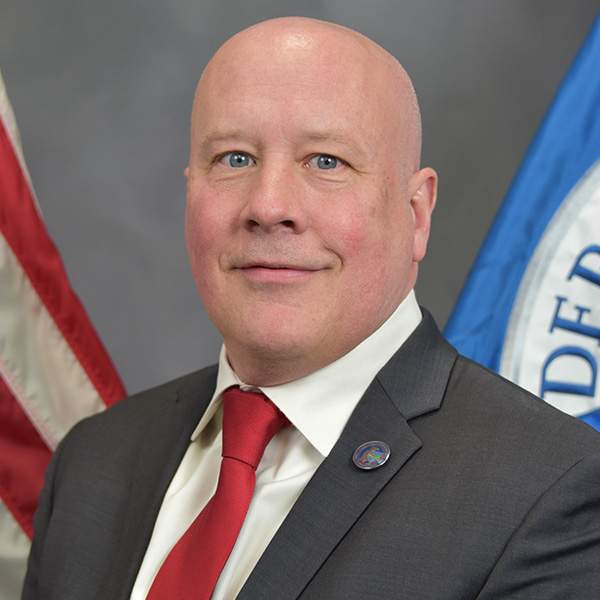 Mike Tetreault is the Cybersecurity Advisor (CSA) for Rhode Island (Region 1), within the Integrated Operations Division, Cybersecurity & Infrastructure Security Agency (CISA) of the Department of Homeland Security (DHS). CISA established ten regional offices across the country to improve the delivery of the department’s services to critical infrastructure owners and operators and state, local, tribal, and territorial partners. CSAs are the front-facing cyber experts supporting regional operations capabilities. Region 1 includes Maine, New Hampshire, Vermont, Connecticut, Rhode Island and Massachusetts.
Mike Tetreault is the Cybersecurity Advisor (CSA) for Rhode Island (Region 1), within the Integrated Operations Division, Cybersecurity & Infrastructure Security Agency (CISA) of the Department of Homeland Security (DHS). CISA established ten regional offices across the country to improve the delivery of the department’s services to critical infrastructure owners and operators and state, local, tribal, and territorial partners. CSAs are the front-facing cyber experts supporting regional operations capabilities. Region 1 includes Maine, New Hampshire, Vermont, Connecticut, Rhode Island and Massachusetts.
Mr. Tetreault manages the major cyber engagements in Rhode Island with additional support to region 1, championing cyber resilience to public and private sector partners through a multitude of engagements, promoting education and awareness, and performing risk assessments.
His career began over 30 years ago as a programmer analyst in the private sector including the last 18 years as an IT Director with the Department of Defense (DoD) before joining CISA in early 2021. He retired as an Army Colonel in May 2021 after 31 years of service. Mike holds a B.S. degree from Bryant College in Computer Information Systems, an MBA in Information Technology from Trident University, an M.S. degree in Government Information Leadership from National Defense University and a M.S. in Strategic Studies from the U.S. Army War College.
Mr. Tetreault transitioned to DHS in 2021 as the first Cybersecurity Advisor for Rhode Island. In this capacity, he has leveraged his previous relationships with the State of Rhode Island Department of Administration, Homeland Security Advisor for RI, Office of the CIO and CISO, Secretary of State, Board of Elections, and the Rhode Island State Police Joint Cyber Task Force to further develop the cyber risk mitigation efforts in the state of Rhode Island.
As an adjunct faculty member at New England Institute of Technology in Rhode Island and Dean College in Massachusetts, Mr. Tetreault teaches graduate and undergraduate courses on cybersecurity governance, policy, risk management and recovery. He serves as a member of the Rhode Island Joint Cyber Task Force (JCTF).
Mike is a certified Department of Defense Chief Information Officer, Chief Information Security Officer, Cyber Leader, Government Strategic Leader, and Enterprise Architect. He is also a Committee on National Security Systems Certified Information Security Professional, System Certifier, Risk Analyst, and Senior System Manager. He is also a Certified Information Systems Security Professional (CISSP) with ISC2.
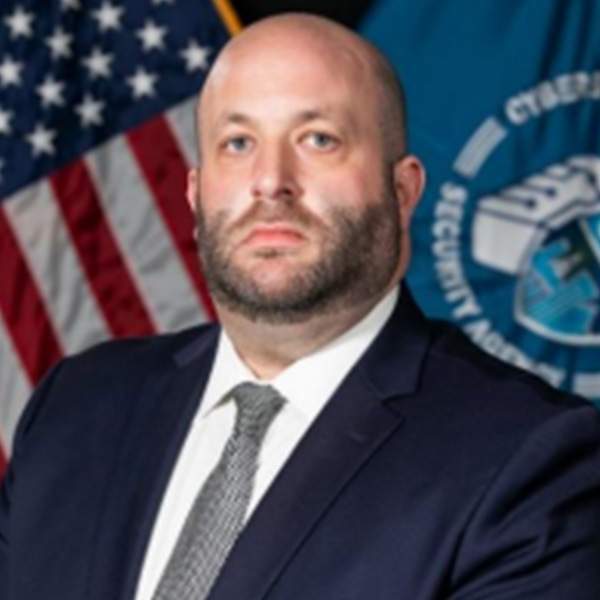 Richard “Rick” Rossi is the Cybersecurity and Infrastructure Security Agency (CISA) Cybersecurity Advisor (CSA) and Cybersecurity State Coordinator (CSC) assigned to the State of New Hampshire.
Richard “Rick” Rossi is the Cybersecurity and Infrastructure Security Agency (CISA) Cybersecurity Advisor (CSA) and Cybersecurity State Coordinator (CSC) assigned to the State of New Hampshire.
Rick has been with the Department for more than 17 years and joined CISA in 2021 as the first CSA assigned to New Hampshire. Prior to joining CISA, he served eight years with the DHS Office of Intelligence & Analysis, most recently as the HUMINT Collection Operations Manager assigned to the New England DomDNI Region, with prior assignments in the agency front office and as the Intelligence Officer assigned to New Hampshire.
In these roles, Rick led regional cyber threat intelligence efforts, as well as the terrorism watchlisting and HUMINT intelligence collection and reporting missions with focal areas including foreign cyber threats to the Homeland, counterterrorism, counterintelligence, transnational organized crime, and economic security. Rick provided expertise on national security cyber threat actors and tactics, as well as forensic analysis and exploitation of cyber threats. He contributed to numerous national-level strategic, operational, and tactical missions and policy initiatives including Operation Warp Speed and Support to U.S. Election Security. Rick also led federal efforts to develop the New England Utility Cybersecurity Integration Collaborative (NEUCIC), which is a unique public-private mission with the energy sector to identify foreign cyber threats targeting the electric grid, natural gas pipelines, and broader energy infrastructure.
Rick earned a Bachelor’s Degree (summa cum laude) from the University of Massachusetts Boston, a Master of Science of Strategic Intelligence from the National Intelligence University, and a Certificate in Legislative Studies from the Government Affairs Institute at Georgetown University. He holds Certified Information Systems Security Professional (CISSP), GIAC Certified Incident Handler (GCIH), GIAC Cyber Threat Intelligence (GCTI), and Certified Ethical Hacker (CEH) cybersecurity certifications, and is a SANS Lethal Forensicator coin holder. Rick is a member of the GIAC Advisory Board.
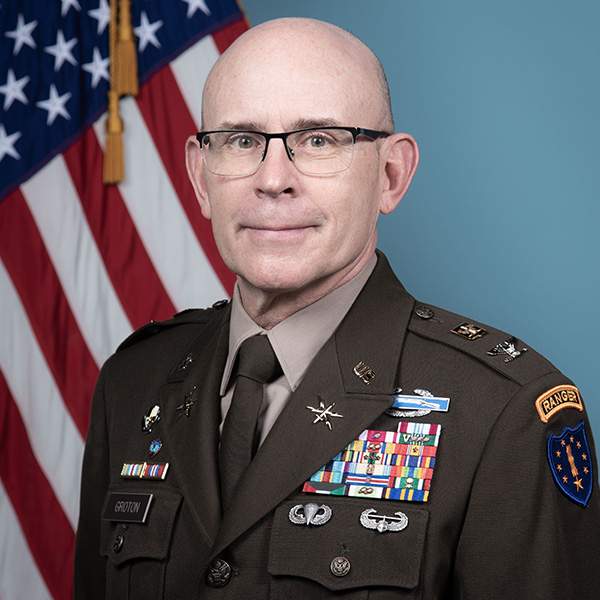 Colonel Woody Groton has served in the US Army for 27 years on active duty and in the Guard and Reserves. He has commanded at every level from platoon through brigade. Woody is one of the founding officers of the Cyber Yankee exercise and is considered a cyber subject matter expert for the National Guard. He currently serves as the senior cyberspace operations officer for the New Hampshire Army National Guard. He is a combat veteran and graduate of the US Army Ranger School.
Colonel Woody Groton has served in the US Army for 27 years on active duty and in the Guard and Reserves. He has commanded at every level from platoon through brigade. Woody is one of the founding officers of the Cyber Yankee exercise and is considered a cyber subject matter expert for the National Guard. He currently serves as the senior cyberspace operations officer for the New Hampshire Army National Guard. He is a combat veteran and graduate of the US Army Ranger School.
In his civilian capacity Woody is a business development executive for Red River focusing on Army/DOD and DHS. Prior to joining Red River Woody was the Chief Information Officer for Draper in Cambridge, Massachusetts. Woody has 25 years’ experience as an IT professional.
COL Groton has a Master of Science in Information Assurance/Cybersecurity from Regis University and a master’s in strategic studies from the Army War College. His military education includes Armor Officer Basic and Advanced Courses, Combined Arms Services Staff School, Command and General Staff College and The Army War College.
From lab to market
 Dr. Eugene Santos, Jr. received his Ph.D. ('92) in Computer Science from Brown University. He is currently the Sydney E. Junkins 1887 Professor of Engineering at the Thayer School of Engineering and Adjunct Professor of Computer Science at Dartmouth College. He is also the Faculty Director for the Master of Engineering program. Dr. Santos’ work on artificial intelligence intersects the areas of information, cognition, human factors, and mathematics. His current focus is on computational intent, dynamic human behavior, and decision-making with an emphasis on learning nonlinear and emergent behaviors and explainable AI. Dr. Santos has applied his work with the goal of better understanding how we, both as individuals and our society, can best leverage knowledge through AI to improve our world for social good. These application areas include computational social systems – group to individual decision-making, opinion and belief change, socio-cultural attitudes and factors, and social resilience; user and team modeling – inferring user intentions and needs, surgical errors and team intention gaps, and effective use of text and data analytics; and, cybersecurity – insider threat and deception detection, misinformation vs. disinformation, and adversarial intent and course of action analysis. Dr. Santos is currently appointed to serve on the Department of the Air Force Scientific Advisory Board (DAF SAB). He also served on the Board of Directors for Sigma Xi, was appointed to the State of Vermont Taskforce on AI, and is a 2019 Public Voices fellow of the OpEd Project. Dr. Santos was Editor-in-Chief for the IEEE Transactions on Cybernetics from 2008-2013. He is a Fellow of the AAAS and IEEE.
Dr. Eugene Santos, Jr. received his Ph.D. ('92) in Computer Science from Brown University. He is currently the Sydney E. Junkins 1887 Professor of Engineering at the Thayer School of Engineering and Adjunct Professor of Computer Science at Dartmouth College. He is also the Faculty Director for the Master of Engineering program. Dr. Santos’ work on artificial intelligence intersects the areas of information, cognition, human factors, and mathematics. His current focus is on computational intent, dynamic human behavior, and decision-making with an emphasis on learning nonlinear and emergent behaviors and explainable AI. Dr. Santos has applied his work with the goal of better understanding how we, both as individuals and our society, can best leverage knowledge through AI to improve our world for social good. These application areas include computational social systems – group to individual decision-making, opinion and belief change, socio-cultural attitudes and factors, and social resilience; user and team modeling – inferring user intentions and needs, surgical errors and team intention gaps, and effective use of text and data analytics; and, cybersecurity – insider threat and deception detection, misinformation vs. disinformation, and adversarial intent and course of action analysis. Dr. Santos is currently appointed to serve on the Department of the Air Force Scientific Advisory Board (DAF SAB). He also served on the Board of Directors for Sigma Xi, was appointed to the State of Vermont Taskforce on AI, and is a 2019 Public Voices fellow of the OpEd Project. Dr. Santos was Editor-in-Chief for the IEEE Transactions on Cybernetics from 2008-2013. He is a Fellow of the AAAS and IEEE.
 Joe Swain graduated from West Point in 2011 and was commissioned as an Adjutant General Officer. He spent nine years on active duty including a combat deployment to Afghanistan and operational deployments to Europe. In his final active duty assignment at MIT Army ROTC he helped to develop and implement the SOCOM Ignite program that aims to partner students with Active Duty special operations units to develop technological solutions to tactical problems during the academic year. In 2020, Joe transitioned from the MIT Army ROTC program to the reserves with the 75th Innovation Command where he continued the SOCOM Ignite program. Joe graduated from Boston College Law School in 2023 and will begin his law career this fall with the Boston office of the international law firm Ropes & Gray LLP.
Joe Swain graduated from West Point in 2011 and was commissioned as an Adjutant General Officer. He spent nine years on active duty including a combat deployment to Afghanistan and operational deployments to Europe. In his final active duty assignment at MIT Army ROTC he helped to develop and implement the SOCOM Ignite program that aims to partner students with Active Duty special operations units to develop technological solutions to tactical problems during the academic year. In 2020, Joe transitioned from the MIT Army ROTC program to the reserves with the 75th Innovation Command where he continued the SOCOM Ignite program. Joe graduated from Boston College Law School in 2023 and will begin his law career this fall with the Boston office of the international law firm Ropes & Gray LLP.
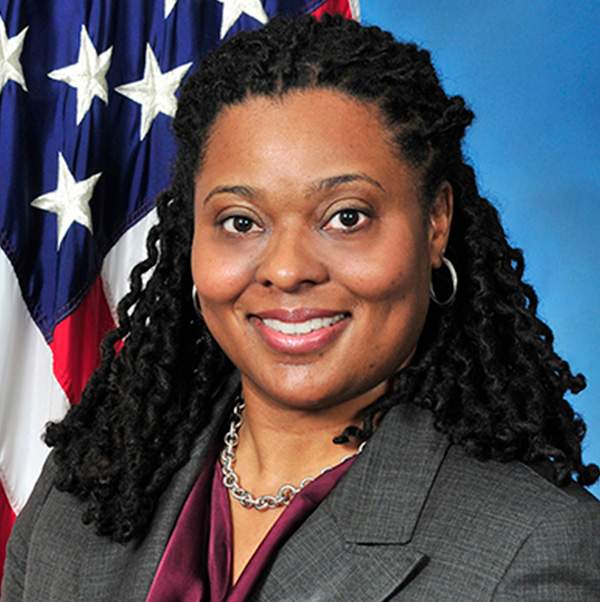 Karen Presley is the Deputy Director of the Office of Research and Technology Applications at the National Security Agency (NSA).
Karen Presley is the Deputy Director of the Office of Research and Technology Applications at the National Security Agency (NSA).
Prior to joining NSA, Karen gained extensive experience in both the public and private sector as an IP attorney with Washington DC law firms, a patent examiner with the U.S. Patent and Trademark Office, an electrical engineer with the Federal Bureau of Investigation, and a computer systems engineer within the private sector. She also served as an adjunct professor with the University of Maryland Global College in the Cyber Security Policy Program.
Ms. Presley is a barred attorney with a Juris Doctor degree from Texas Southern University. She also earned a Master of Business Administration degree from New York University Stern School of Business, a Master of Laws degree in Intellectual Property from George Washington University Law School and a Bachelor of Science degree in Electrical Engineering from North Carolina A&T State University.
Fueling our future
 Pete Mathias is a Partner at Alumni Ventures, one of the most active venture funds in the U.S. He began his venture career as a Fellow at 406 Ventures and as a founder in the Harvard Innovation Lab. Holding a Distinction graduate degree from the University of Oxford (U.S. History), an MBA and an A.B. (magna cum laude) from Dartmouth College and Tuck, as well as an MPA from Harvard University, Pete’s academic focus on history and policy informs his investing areas: critical areas of American development.
Pete Mathias is a Partner at Alumni Ventures, one of the most active venture funds in the U.S. He began his venture career as a Fellow at 406 Ventures and as a founder in the Harvard Innovation Lab. Holding a Distinction graduate degree from the University of Oxford (U.S. History), an MBA and an A.B. (magna cum laude) from Dartmouth College and Tuck, as well as an MPA from Harvard University, Pete’s academic focus on history and policy informs his investing areas: critical areas of American development.
He is a member of the Council on Foreign Relations (CFR), the New York Economic Club (ECNY), and the American Council on Germany (ACG). Pete is also drummer for the indie rock band Filligar, designated a "Cultural Ambassador" by the U.S. Department of State. This dual passion for music and tech led to Filligar's early involvement in testing innovative applications.
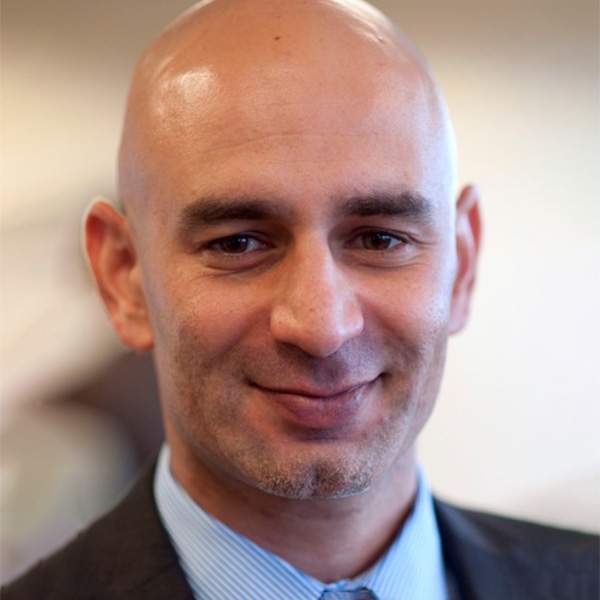 Mike Baskin is an expert in energy security with a particular focus on the U.S. Department of Defense (DOD), building on his background in the military and experience working with the U.S. Department of Energy and Office of Energy Efficiency and Renewable Energy (EERE). He has over 10+ years of work focused on clean energy, paired with a deep understanding of the challenges DOD faces regarding energy and logistics. He previously served as a fellow at DOE, where he launched the Solar Ready Vets program, led an energy sector hiring initiative for veterans for the First Lady’s Joining Forces initiative, and was a liaison between the EERE and DOD. He has also led an accelerator program and several “Shark Tank” pitch competitions while serving as an innovation advisor at Idaho National Laboratory (INL).
Mike Baskin is an expert in energy security with a particular focus on the U.S. Department of Defense (DOD), building on his background in the military and experience working with the U.S. Department of Energy and Office of Energy Efficiency and Renewable Energy (EERE). He has over 10+ years of work focused on clean energy, paired with a deep understanding of the challenges DOD faces regarding energy and logistics. He previously served as a fellow at DOE, where he launched the Solar Ready Vets program, led an energy sector hiring initiative for veterans for the First Lady’s Joining Forces initiative, and was a liaison between the EERE and DOD. He has also led an accelerator program and several “Shark Tank” pitch competitions while serving as an innovation advisor at Idaho National Laboratory (INL).
Mike has published articles with outlets such as Greentech Media, War on the Rocks, Modern War Institute, the Harvard Program on Negotiation, and Military Times, focused on topics including energy, negotiation, and veterans affairs. He is a former U.S. Army infantry officer with deployments to Afghanistan and Iraq and was awarded the Bronze Star (OLC) for his service. In response to the Russian invasion of Ukraine, Mike developed and led a trauma support effort in Poland and Ukraine.
He holds a bachelor’s degree from the U.S. Military Academy at West Point; a master’s from the Interdisciplinary Center (IDC) Herzliya, Israel; and a doctorate in international affairs from the Fletcher School of Law and Diplomacy at Tufts University.
Afternoon Keynote Speaker
 Mike Pyle currently serves as the Deputy National Security Advisor for International Economics and G7/G20 Sherpa.
Mike Pyle currently serves as the Deputy National Security Advisor for International Economics and G7/G20 Sherpa.
Mike most recently served as the Chief Economic Advisor to Vice President Harris. Pyle previously served for five years in the Obama-Biden administration, including in the White House as a special assistant to the President for economic policy, working across a wide range of international and domestic economic policy issues; in international affairs at the U.S. Department of Treasury as the chief of staff to then-Under Secretary Lael Brainard; and in the Office of Management and Budget as an advisor to Director Peter Orszag.
Before the Biden-Harris Administration, Pyle was the global chief investment strategist at BlackRock, after prior multi-asset investing roles there, first as a macroeconomic researcher and portfolio manager and then as the deputy chief investment officer. He began his career as a law clerk to then-Judge Merrick Garland. Raised in a farming community in Central Illinois, Pyle graduated with a degree in economics from Dartmouth College, earned his law degree from Yale Law School, and studied graduate economics and law at Cambridge University.
Small Group Discussions
Go-To-Market with Government
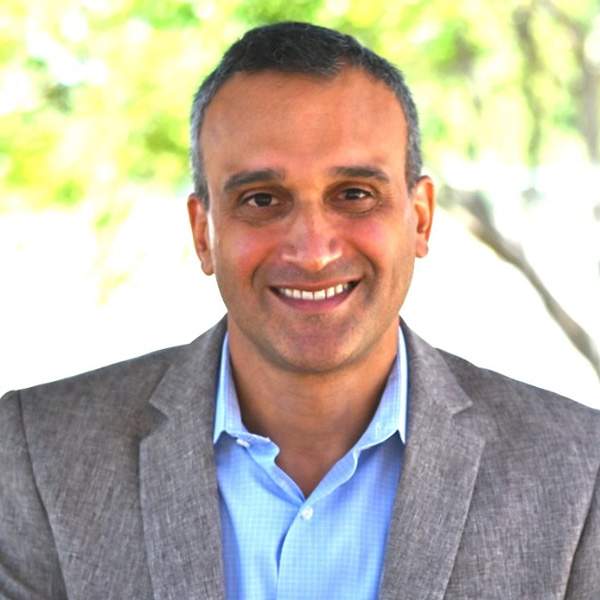 Col Aneel "Cramden" Alvares is the Director of Defense Engagement, Air Force Lead, and Boston Lead at the Defense Innovation Unit.
Col Aneel "Cramden" Alvares is the Director of Defense Engagement, Air Force Lead, and Boston Lead at the Defense Innovation Unit.
His military background includes experience as a B-1 pilot, terminal attack controller, and operational test and evaluation leader, with ground and air combat time in both Iraq and Afghanistan. In his current role, he leads DIU’s Defense Engagement Team in framing new projects by leveraging commercial sector technologies to address priority DoD problems, while also working to engage the greater Boston and east coast innovation ecosystems.
 Bill Cameron, Managing Director and Co-founder of 3Comply, helps public and private sector clients comply simply with extensive experience in IT management, security, and compliance. Prior to 3Comply Bill was a Security and Compliance Officer for BT (British Telecom), where he helped their US Federal division win many high-profile government contracts. Bill’s industry experience also includes extensive biopharmaceutical, software development, consumer goods, and food manufacturing.
Bill Cameron, Managing Director and Co-founder of 3Comply, helps public and private sector clients comply simply with extensive experience in IT management, security, and compliance. Prior to 3Comply Bill was a Security and Compliance Officer for BT (British Telecom), where he helped their US Federal division win many high-profile government contracts. Bill’s industry experience also includes extensive biopharmaceutical, software development, consumer goods, and food manufacturing.
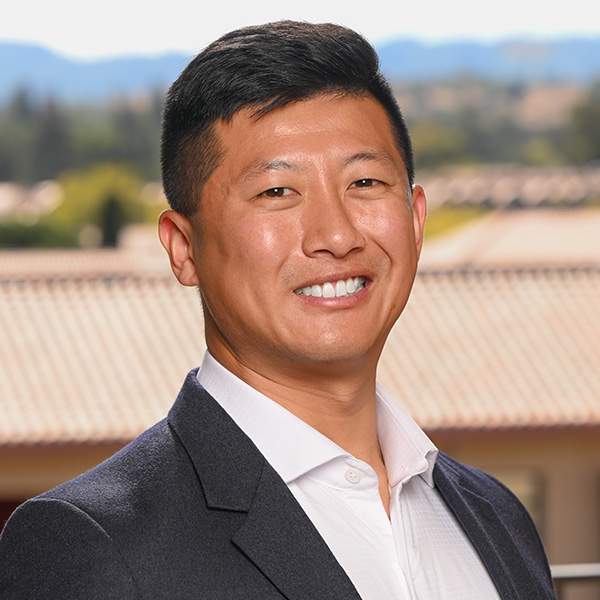 Kevin Liu Huang is the founder and CEO of Dextral, a startup that uses AI to source and qualify leads for government sales teams (particularly dual-use companies). A recent Stanford MBA graduate and Harvard undergraduate, Kevin has also served eight years in the Marine Corps as a Logistics Officer. He commands Marine Wine Support Squadron 473, Motor Transport Company, and was the author of Chiral Defense, a newsletter dedicated to covering exits and fundraising milestones for cybersecurity, space, and autonomy companies. Kevin also has five years of corporate strategy experience with Capital One and Visa, Inc. He is currently based in San Francisco, CA.
Kevin Liu Huang is the founder and CEO of Dextral, a startup that uses AI to source and qualify leads for government sales teams (particularly dual-use companies). A recent Stanford MBA graduate and Harvard undergraduate, Kevin has also served eight years in the Marine Corps as a Logistics Officer. He commands Marine Wine Support Squadron 473, Motor Transport Company, and was the author of Chiral Defense, a newsletter dedicated to covering exits and fundraising milestones for cybersecurity, space, and autonomy companies. Kevin also has five years of corporate strategy experience with Capital One and Visa, Inc. He is currently based in San Francisco, CA.
A Path Forward
 Lauren Zabierek is a Senior Advisor in the Cybersecurity Division at CISA with over 20 years in national security. Previously, she served as the Executive Director of the Cyber Project at the Harvard Kennedy School’s Belfer Center, where she ran a policy-relevant research program and managed students and nonresident fellows. She also served as the Acting Executive Director of the Belfer Center in her final semester there. She came to that role as a 2019 graduate of the Kenney School’s midcareer MPA program. Prior to graduate school, she was an early member of the cybersecurity firm Recorded Future, having established and managed their public sector team. She also served as a civilian intelligence analyst at the National Geospatial Intelligence Agency with multiple deployments to Afghanistan and served as a US Air Force intelligence officer at the beginning of her career. Lauren is also the co-founder of the online social media movement, #ShareTheMicInCyber. She is a mentor with Girl Security, a fellow at the National Security Institute at George Mason University, and a fellow at New America. She has appeared on television, radio, and several podcasts and panels.
Lauren Zabierek is a Senior Advisor in the Cybersecurity Division at CISA with over 20 years in national security. Previously, she served as the Executive Director of the Cyber Project at the Harvard Kennedy School’s Belfer Center, where she ran a policy-relevant research program and managed students and nonresident fellows. She also served as the Acting Executive Director of the Belfer Center in her final semester there. She came to that role as a 2019 graduate of the Kenney School’s midcareer MPA program. Prior to graduate school, she was an early member of the cybersecurity firm Recorded Future, having established and managed their public sector team. She also served as a civilian intelligence analyst at the National Geospatial Intelligence Agency with multiple deployments to Afghanistan and served as a US Air Force intelligence officer at the beginning of her career. Lauren is also the co-founder of the online social media movement, #ShareTheMicInCyber. She is a mentor with Girl Security, a fellow at the National Security Institute at George Mason University, and a fellow at New America. She has appeared on television, radio, and several podcasts and panels.
Jeremy Hitchcock – See above
 David Skinner is the Northeast Regional Director of the National Security Innovation Network (NSIN). NSIN's mission is to build networks of innovators, venture capital, and academia to provide emerging tech solutions to the Department of Defense. Prior to NSIN, David had a 20-year career as an FBI agent where he worked national security matters including identifying and mitigating counterintelligence threats to emerging technology and research. David also served in the US Marine Corps as an aviation logistics officer. David holds a BS in engineering from the US Naval Academy, and a masters degree in engineering management from Old Dominion University.
David Skinner is the Northeast Regional Director of the National Security Innovation Network (NSIN). NSIN's mission is to build networks of innovators, venture capital, and academia to provide emerging tech solutions to the Department of Defense. Prior to NSIN, David had a 20-year career as an FBI agent where he worked national security matters including identifying and mitigating counterintelligence threats to emerging technology and research. David also served in the US Marine Corps as an aviation logistics officer. David holds a BS in engineering from the US Naval Academy, and a masters degree in engineering management from Old Dominion University.